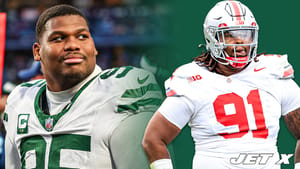After firing head coach Robert Saleh and general manager Joe Douglas, the New York Jets have taken a new approach to their hiring process. To avoid repeating past mistakes, they hired The 33rd Team, an outside consulting firm, to run their leadership search.
Since then, the Jets have interviewed or are scheduled to interview 15 general manager candidates and 17 head coach candidates. They are casting a wide net to find the best options and to learn about other successful organizations.
While it’s important to exhaust all of your options, interviewing 32 individuals may be a bit excessive. Yet, they still managed to overlook some intriguing head coach candidates like Mike McCarthy, Todd Monken, Kliff Kingsbury, and Ben Johnson – although some of these candidates likely aren’t interested. The latter two reportedly expressed this, while the Jets chose Adam Gase over the first two in 2019.
While much of the focus is on the number of candidates the Jets are interviewing, there is another startling trend with the Jets’ search process. During the Jets’ pursuit of Mike Vrabel, it was widely speculated that they would give him significant input on the next general manager.
Vrabel has since joined the New England Patriots, but this sentiment hasn’t seemed to change as they look at alternate candidates. In reports linking them to New York, the Jets’ coaching candidates are commonly paired with a general manager they have experience with.
While it’s important to have familiarity and a good working relationship, that should not dictate the Jets’ hire – especially considering general managers commonly have a bigger impact on the team.
Analyzing the impact of GMs and HCs on team success
While I’ve long believed that general managers have a greater effect on team success than head coaches, I wanted data to back up this claim. To do this, I studied the correlation between team success and the reputations of general managers and head coaches in recent NFL seasons.
It is difficult to find a definitive ranking of exactly how “good” each general manager and head coach is. The best reference point I could find was Patrick Daugherty of NBC Sports’ yearly NFL general manager and head coach rankings from 2021-24, which I used as the basis for my analysis.
Since the rankings come out in the spring/early summer, the rankings are more based on the previous years’ record than the following. As such, I compared the 2024 rankings against the 2023 win totals of each team, and so on.
Using Daughtery’s rankings from 2021-24 and each team’s win-loss records, I calculated two key metrics:
- Correlation Coefficient: Measures how closely two factors are related, ranging from -100% (negative correlation) to 100% (positive correlation).
- Coefficient of Determination: Shows how much one factor explains the other, ranging from 0% to 100%.
General managers had a correlation coefficient of -75.9%, while head coaches had a correlation of -61.8%. This tells us that the ranking of general managers correlated more closely with teams’ records than the ranking of head coaches.
While the difference is significant, both positions have a fairly linear connection with winning, which is expected. However, the coefficient of determination showed that 57.6% of a team’s record was tied to general managers, compared to just 38.3% for head coaches. This means general managers had a 50.4% stronger impact on team performance.
It has to be noted that these rankings are based on one person’s perspective and cannot be viewed as definitive. However, the results reflect a broader truth: teams with highly ranked general managers tend to perform better than teams with highly ranked head coaches.
General managers, not head coaches, drive long-term success
When people predict Super Bowl contenders, they often focus on the quarterback. A great quarterback makes a huge difference, but a team’s success depends on more than one player. While quarterbacks are critical, they represent just one player on a roster of 53. Behind every successful team are 21 other starters and several role players who are equally essential to sustained success.
The same happens when looking beyond the players. The head coach is often seen as the face of the franchise. They set the tone for the locker room, manage the culture, and lead the team on game day. As a result, they receive disproportionate credit—or blame—for a team’s performance.
However, even great head coaches need a strong roster. Take Mike Tomlin and Bill Belichick, for example. Both are future Hall of Famers, but they’ve struggled throughout the 2020s as their rosters declined. On the other hand, successful general managers keep teams competitive over a long-term period despite changes at head coach or quarterback.
Consider the Buccaneers, Cowboys, Eagles, Rams, Ravens, Saints, and Seahawks. These teams have had the same general manager for over a decade. During that time, they’ve all been regular playoff contenders.
What the Jets should prioritize
The Jets must avoid pairing hires simply because of familiarity. While a good relationship between the head coach and general manager is important, it should not dictate the decision. The Jets need to focus on finding the best candidates for each role.
The general manager, in particular, is critical. They control the roster and the team’s long-term strategy. Picking the right general manager will lay the foundation for sustainable success.
It seems as if the Jets are trying to do things differently this time. Now, they need to follow through by prioritizing strong leadership and building a winning foundation.








